By Becca Muncy
While any book lover will tell you that reading is a year-round activity, there’s something special about getting caught up in a new book during the fall. The cooler temperatures, the longer nights – it makes me want to hibernate under a cozy blanket by a roaring fire (even if a fireplace isn’t the most practical thing in a Texas house).
Sarah Freeland, branch manager of the Waco-McLennan County Central Library, says there are two types of fall readers: those who want to scare themselves with spooky horror stories, and those who just want to curl up with cozy, comforting books. She says she falls more into the latter group, favoring “golden-age” mysteries by Agatha Christie and Dorthory Sayer and childhood classics like the Harry Potter series.
Similarly, Alison Frenzel, co-owner of Fabled Bookshop & Cafe in downtown Waco, says she prefers historical fiction (like A Most English Princess by Clare McHugh), classics (like Anne of Green Gables or Wuthering Heights), or just a good page-turner in lieu of truly scary stories. But for those who want to dip their toes into a bit of spookiness, Freeland recommends works by Stepehen King (like It), Shirley Jackson (such as The Haunting of Hill House or We Have Always Lived in the Castle), and Edgar Allen Poe. And Frenzel suggests checking out Home Before Dark by Riley Sager or Ghosts of Harvard by Francesca Serritella, which were both released earlier this summer.
At the library, Freeland says that seasonal picture and non-fiction children’s books became especially popular as the weather changes, particularly books like Red Leaf, Yellow Leaf and Goodbye Summer, Hello Autumn, which teach children about the transition from summer to fall. She says that those books remain popular year after year as parents check them out to help their kids “understand what’s going on in the natural world.” And at Fabled, Frenzel says the spooky books that crowd the display table at the front of the store, the “books that feel creepy, that feel mysterious,” are a big hit during this season.
Some of the best books are released in the fall months. Publishers typically publish books that they know will perform well during September, October, and November, in anticipation of the Christmas shopping season. If a great book comes out in the fall, chances are someone will read it and then buy it as a gift for a friend or family member. So if you stop by a bookstore or library in the next few weeks, you’ve got a lot of good options! Here are some soon-to-be published and recently released books that Freeland and Frenzel are excited about:
- Anxious People by Fredrick Backman (published September 8)
- The Invisible Life of Addie LaRue by V.E. Schwab (published October 6)
- The Searcher by Tana French (Chicago cop thriller, published 10/6)
- A Time for Mercy by John Grisham (the sequel to A Time to Kill, published October 13)
- Just Like You by Nick Hornby (out 10/31)
- What Kind of Woman by Kate Baer (Baer’s poetry debut, out November 10)
- Promised Land by Barack Obama (Obama’s memoir, out November 17. This book is so highly anticipated that the Booker Prize rescheduled its awards ceremony so this book could be included in the running)
If you’re looking for a new release to spice up your November book club, Frenzel suggests We Keep the Dead Close by Becky Cooper. Frenzel says this book, which follows an unsolved murder msytery at Harvard, would be a good choice for a book club because it’s a good conversation starter. She says, “It was a fascinating book, I read it in probably two days… several of our staff members read it and we all had different opinions about what we thought about it.” Keep the Dead Close comes out on November 10.
If you’re looking for more recommendations, check out the library’s “discovery boxes” and “book bundles,” which launch in November. The discovery boxes, curated by Waco librarians, are filled with resources (books, DVDs, etc) about a certain topic or interest, and are a great way to get immersed in a new hobby or learn about a new subject. Book bundles are also a great way to discover new books. Pick a genre and let a librarian surprise you with 5 books from that genre.
Hopefully, these recommendations have inspired you to pick up something new the next time you’re shopping for books, to dive into some spooky stories now that Halloween is just around the corner, or to just rediscover the joy of reading. So the only thing to do now is grab a hot drink, get cozy, and relax with a great new book! Happy fall, everyone!

Becca Muncy is an Act Locally intern from Dallas. She is studying professional writing at Baylor University and is completing her senior year.
The Act Locally Waco blog publishes posts with a connection to these aspirations for Waco. If you are interested in writing for the Act Locally Waco Blog, please email [email protected]for more information.
By Christine Perera
As a part-time resident assistant at an assisted living facility in my hometown of Boerne (TX), I have the pleasure of getting to know senior citizens. While at school, I look forward to summers spent reconnecting with residents at The Heritage Place. When I entered the facility this summer, however, things were different. Instead of a warm welcoming, all the residents were tucked away in their rooms. Social distancing policies made interactions between residents scarce and reconnection a luxury that many assisted living facilities can no longer afford.
Since COVID-19 broke out, everyone has made sacrifices. At the living facility, residents sacrificed communal dining experiences for meals taken in lonely rooms. I have helped with delivering such meals to residents, and there is one instance my mind often revisits. I pushed an old busser cart filled with trays of homemade tomato soup, and the tangy, comforting scent followed me down the long, carpeted hall. When I arrived at the first door, I balanced a tray in my arms and, as one hand lifted to knock on the door, the tray began to slip from the other. Hot soup spilled all over the floor, causing me to jump back in surprise. Luckily, I knew the kitchen had a large pot of soup on the stove. I didn’t bat an eye as I mopped up the mess and headed back to the kitchen for another bowl. Instead, I took comfort in knowing that such a small mistake could happen to anyone. As I learned more about senior hunger, this very thought developed into a source of worry.
Many people do not have the means to access another bowl of soup when they need it. My experience as an intern for the Baylor Collaborative on Hunger and Poverty showed me that sometimes accidents, like dropping food, cause senior citizens with already limited food access to go hungry. Being unable to physically get more food can also have long-term health consequences.
Amidst the global pandemic, obstacles to food accessibility have become a larger problem than normal. This is especially true for home-bound senior citizens, who face new difficulties in accessing food due to the virus. While stay-at-home orders keep COVID-19 in check, they can also make trips to the grocery store a frightful task for those at increased risk of contracting severe cases of COVID-19. Because of the high risks, caring for vulnerable populations, such as the elderly, is more important than ever before.
Meals on Wheels is a food aid program that delivers nutritious meals to senior citizens. The program also helps look after the in-home safety of participants, connect participants with their communities, and increase socialization. According to Debbie King, Executive Director of Meals on Wheels in Waco, volunteers are sometimes the only people participants interact with all day. While delivering meals, volunteers chat with seniors and take note of health issues they believe might indicate severe or life-threatening conditions. These health issues are then reported to worried family members, who may live far away and be unable to check on their loved ones themselves.
According to the More Than A Meal Comprehensive Network Study, in-home health assessments (safety checks), social opportunity, and nutritional access make Meals on Wheels an invaluable program. Many families take comfort in knowing they can rely on Meals on Wheels volunteers during these unprecedented times. Additionally, those who cannot afford care at a senior facility can receive aid at a fraction of the private and/or public cost. For reference, the average cost of board at a senior facility is $57,000/year, in comparison to Meals on Wheels participation, which costs the organization roughly $2,000/year per person (based on Texas data). Unfortunately, due to decreased funding and increased demand, Meals on Wheels in Waco may soon be unable to support all its participants.
Meal on Wheels is supported by federal and state grant programs. The recent elimination of federal grants that once funded Meals on Wheels have made program budgets tighten. A statement from Meals on Wheels America President and CEO Ellie Hollander revealed that among cut grants are the Community Services Block Grant (CSBG), Community Development Block Grant (CDBG) and Social Services Block Grant (SSBG).
Texans Feeding Texans is a grant that Waco’s Meals on Wheels chapter relies on, and Texans Feeding Texans is also at risk of losing funding. Texans Feeding Texans is a state grant funded by the Texas Department of Agriculture. The Texas State Department recently decreased the Texas Department of Agriculture’s budget by 5%, creating a loss of up to $1,400,000 during the current biennium. This budget cut means there is less money available to fund grant programs. When the Texas legislature evaluates the Texans Feeding Texans grant in 2021, the program risks reduced funding if not enough people advocate for it.
Meals on Wheels in Waco is also supported by local funders and volunteers. Many local healthcare providers and non-profit organizations sustain Meals on Wheels through fundraising and donations. Volunteers play a key role in getting the meals to Meals on Wheels participants. Because of COVID-19, people may feel reluctant to physically help their community members. Additionally, limited funds have presented obstacles in delivering meals to all program participants. Whereas the Waco chapter used to deliver food daily, King stated that local volunteers now visit with participants 3-5 times per week.
Since COVID-19 broke out in February, Meals on Wheels in Waco has experienced a 20% increase in participants. The national Meals on Wheels program had a 47% increase in participants since March. The program has spent more than originally planned to ensure meals are made and delivered per CDC health guidelines. To compensate for the unpredictability of food resources, King explained that Meals on Wheels in Waco also increased portion sizes by 30%. The extra costs of such care-inspired decisions and limited funds have increased net costs of delivering meals by 97% (according to a national Meals on Wheels Pulse survey). If the net costs of delivering meals remains so high, Meals on Wheels chapters may be unable to reach all participants at the same time that participants are more reliant on food accessibility assistance than ever.
The Waco community cannot afford to be complacent about senior hunger. Wacoans have a duty to get involved with our community so programs like Meals on Wheels get the funding and support they deserve. There are many ways you can get involved. Stay informed about local, state, and federal government and call your representatives to advocate for program funding through grants such as Texans Feeding Texans. Make time to deliver meals to vulnerable community members. Donate money to your local Meals on Wheels chapter to help senior citizens get the food they need. These actions will allow Meals on Wheels to access much needed supplies, deliver more meals, and conduct more safety checks. Please visit www.mealsonwheelsamerica.org (national organization) and www.mowwaco.org (Waco chapter) to contribute to or learn more about the Meals on Wheels program.

Christine Perera is a senior at Baylor University. She is an intern for the Baylor Collaborative on Hunger and Poverty. Christine is majoring in Professional Writing/Rhetoric and minoring in Philosophy. In her free time, she loves to read and take long walks with her dog.
The Act Locally Waco blog publishes posts with a connection to these aspirations for Waco. If you are interested in writing for the Act Locally Waco Blog, please email [email protected]for more information.
Notes:
- Hollander, Ellie. STATEMENT ON PRESIDENT’S FISCAL YEAR 2020 BUDGET, 2019, www.mealsonwheelsamerica.org/learn-more/national/press-room/news/2019/03/11/statement-on-president-s-fiscal-year-2020-budget.
- King, Debbie. “Texans Feeding Texans.” Meals on Wheels Waco. 30 Sept. 2020, Online meeting.
- Meals on Wheels America. “A Story of Meals on Wheels in Communities Across the Country Study Summary.” More Than a Meal Comprehensive Network Study, 2019.
- NEW SURVEY DATA: MEALS ON WHEELS NATIONAL NETWORK CONTINUES TO FACE UNPRECEDENTED DEMAND AND RISING COSTS DUE TO COVID-19, 2020, www.mealsonwheelsamerica.org/learn-more/national/press-room/news/2020/08/12/new-survey-data-meals-on-wheels-national-network-continues-to-face-unprecedented-demand-and-rising-costs-due-to-covid-19.
- Perera, Christine S, and Debbie King. “Conversation About Meals on Wheels.” 29 Sept. 2020.
(City council, school board, planning commission, county commissioners – these groups and several others represent us. They do the day to day work of running our community. It is our responsibility to keep informed about their work so that we can help them represent us effectively. “Civic Insights” by Jeffrey Vitarius is a regular feature of Act Locally Waco. Its purpose is to help us understand decisions that shape our community so that we can participate effectively as informed, engaged residents of Waco. – ALW)
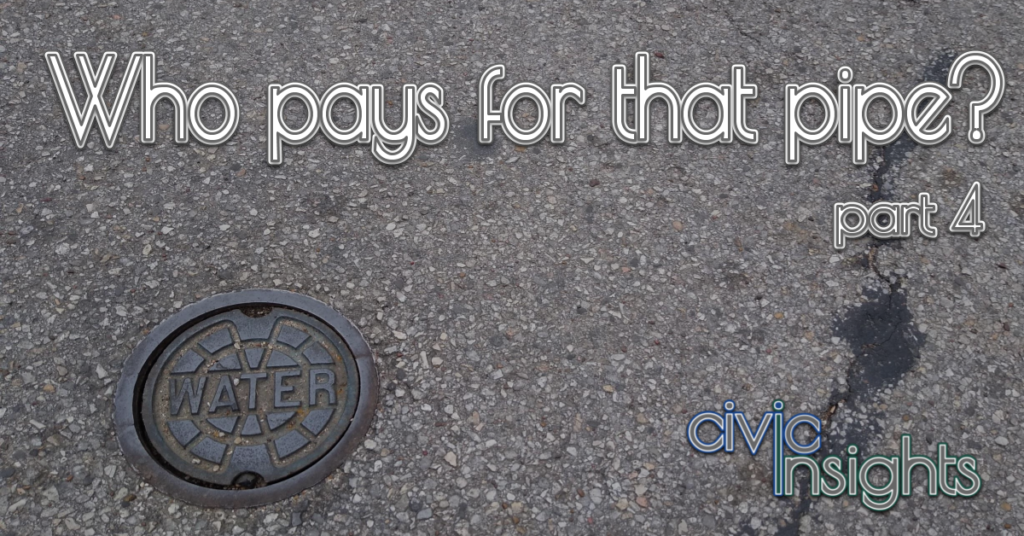
By Jeffrey Vitarius
Back in September, we began this series with a broad look at what an impact fee policy is. A month ago, we focused on the legal process for establishing an impact fee. Two weeks ago, we took a look at pipe-related details of the report that serves as the basis for any impact fee policy in Waco. This week, we’ll take a look at the road side of things. Then we will wrap up next week, by looking at the policy the City considered on October 20th.
As a bit of reminder, we are working our way through the following steps that were used to calculate maximum impact fees:
- Determine a service area
- Identify a way to connect demand for service to supply for service
- Calculate increased demand for services
- Review existing supply for services
- Determine and cost projects needed to meet increased demand
- Identify service unit to divide costs amongst projects
- Calculate maximum impact fees
1. Service Area
As you may recall from two weeks ago, service areas are the geographic boundaries of the impact fee policy. Chapter 395 provides guidance on what these areas can be or must be. For roads, there is a unique limitation that is not applied to pipes. Service areas for roads are limited to about twelve miles across (technically a six-mile radius). The reasoning here is that one part of town should not have to pay for the roads of a different part of town. For pipes the network is considered as a united system, whereas with roads smaller service areas are required. Additionally, a service area for roads cannot extend beyond the city limits (excluding the Extra-Terratorial Jurisdiction).
How these twelve mile “areas” are drawn is left up to the city or county looking to begin impact fees. For Waco the service areas ended up as this map:
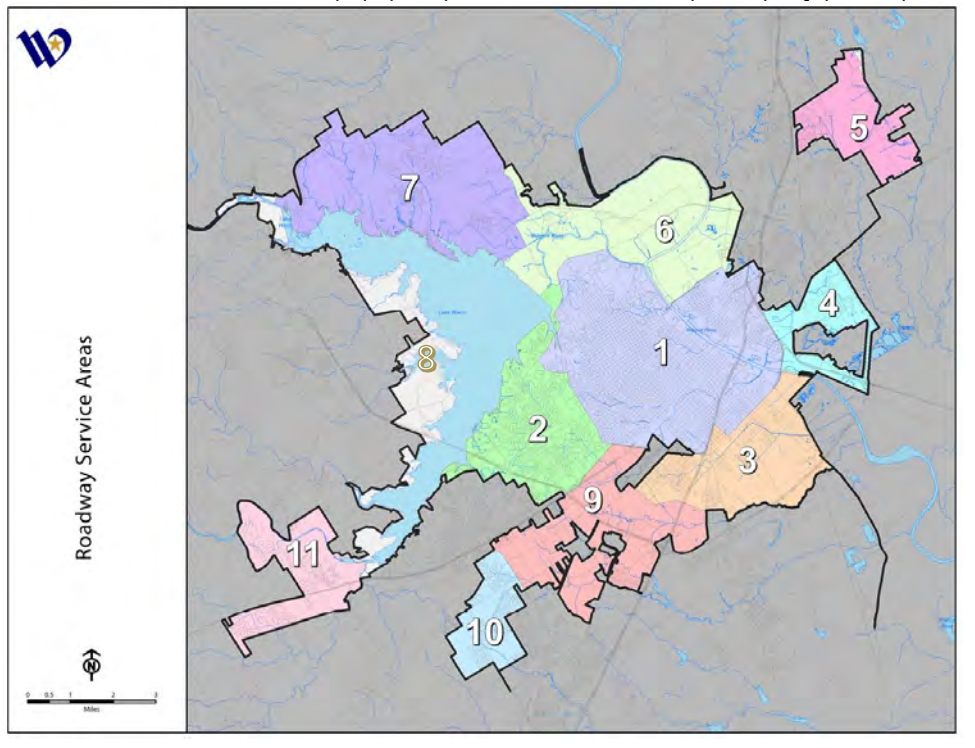
2. Connecting Demand and Supply
We will once again need to find some measurement to connect a new house or business park (demand) to the existing system of roads and any potential expansions (supply). The measurement needs to be scalable to the variety of demands that will come from new development and be measurable for distinct projects and supply systems. For roads, that measure is vehicle-mile at the PM peak hour. That probably needs some unpacking.
In thinking about the kind of measure we need here, the first impulse might be to simply count the cars. How many vehicles use the road system at any given point in time? That would get us part of the way there, but would miss a critical question: how far are those cars going? A car going a couple miles to a local restaurant “uses” substantially less roadway than a car going ten miles to work.
So we need to know not only how many cars are out there, but how far all of them are going. That is how we get to vehicle-miles. Ten cars going one mile has the same “vehicle miles” as one care going ten miles (10 cars x 1 mile = 10 vehicle-miles vs 1 car x 10 miles = 10 vehicle-miles).
On top of this, roadway use changes throughout the day, much like pipes (diurnal patterns). Road use peaks in the AM and the PM rush hours with less use in between. So, for the sake of impact fees the PM peak hour is used to measure vehicle-miles.
3. Increased Demand
Projecting how much Waco will grow overall, and where that growth will occur follows the exact same pattern that was used for pipes. For roads, however, a simple breakdown between growth in residents and employees will not be enough to fully capture the impact on roadways. For roads, the kind of employment becomes important.
We can see this if we think about the differences between a small industrial center and a retail park. Both may hire the same number of employees, but they generate substantially different vehicle-miles. At the industrial center, employees arrive and leave plus the occasional shipment of goods. However, at the retail center not only do you have employees and shipments coming and going, you also have customers.
To account for this our consultants, Freese and Nichols, broke employment growth down into basic, retail, and service categories. Each of these have a different impact on vehicle-miles. They then translated the number of new employees into anticipated square feet of use and bridged from that measure into vehicle-miles. For new residents, they looked at growth on a residences (rather than residents) basis.
Combining all this together they were able to project increased vehicle-mile demand for each of the service areas over the next ten years.
4. Existing Supply and 5. New Projects
A factor of particular importance in looking at how the current roadways will be able to accommodate the increased pressures of growth is how much are they currently being used. Pipes are metered. Water users are billed based on how much demand they put on the current systems. So it is fairly simple to gather information about current use. Roads are different. Their use is not tracked nearly as closely. For the sake of this study, Freese and Nichols relied on traffic counts that were collected on thirty separate locations across the city in May of 2019.
They then compared these counts to the traffic capacity of various road segments (think of these as the bits of road where the road stays the same, so the part of x drive that has four lanes is separated from the part that has two lanes). Capacity can normally be determined by looking at the design of the road. On a really rough level, you can see that I-35 has more capacity than Waco Drive which has more capacity than 10th Street. So looking at the current use and the design capacity of each roadway you can figure how many additional vehicle miles you can add in without needing to change the road (incidentally there are some roads that are already used more than their capacity, these “deficits” are ultimately taken out of the calculation of improvement cost since they are not a result of new demand).
Much like with pipes, Freese and Nichols along with City Staff then identified a number of improvements that might be eligible for impact fee funding. Unlike pipes, these projects were assigned to specific service areas. Where a project crossed the boundary between two service areas, its costs were split between the two. These projects were then examined for the amount of vehicle-mile capacity they added to the service area. So long as this added capacity was less than the increased demand in that service area (see step 3) the entire cost of the projects for that area could be included in the impact fee calculation. Where the added capacity was more than the increased demand, only that portion of the projects that covered the increased demand could be considered.
Combining all the allowable costs together, the report then applies the same 50% credit to the costs that we discussed with pipes. At the end of this process we have the total eligible impact fee cost – the total cost of increased capacity due to new demand after consideration of a credit for future taxes for each service area.
6. Service Unit
Chapter 395 calls for the establishment of a service unit specifically. It defines this (in broad terms) as a standardized measure of use. Although vehicle-miles remain a good connector between supply and demand, it is difficult to determine the exact number of vehicle-miles any given development would generate. So, the study scales vehicle-miles on the basis of a single-family residence. Basically, we look at each development in terms of how it relates to the demand generated by a single-family residence.
As was mentioned above, in general you can calculate the vehicle-miles produced by any given development based on its characteristics. We look at this in terms ultimately of trip total trip length. That is the number of vehicle-miles generated by the development. There are a number of interesting factors that go into this calculation (like trip generation, individual trip length, adjustments for diverted trips and local conditions), but we don’t have the space to get into all of these here. Instead we can go with a nice round number example. Let’s assume a single-family residence produces 4 miles of adjusted trip length and a retail store produces 12. The retail store will be scaled so that it can be measured as a multiple of a single family residence. With this example that multiple is 3 (12 divided by 4).
Here are some of the real ratios to give you an idea of how they work in the study. A hospital is anticipated to generate 1.72 times the demand of a single-family residence for every 1,000 square feet it contains. A clinic, in contrast, generates 5.81 times the demand of a single-family residence for every 1,000 square feet. These ratios allow for the generation of a comprehensible unit of measure to distribute the costs of the improvements.
7. Maximum Impact Fee
Knowing our service unit and our total eligible costs, the final step can be taken. A projection is made of the total new service units anticipated by development (for roads this projection relies heavily on land use assumptions since different kinds of development vary greatly in terms of trip generation). This projection is made on the basis of the service areas we noted above. For example, service area five as zero anticipated growth in service units. Whereas, service area one anticipates 15,947 new single-family resident equivalents. The chart below completes the process.
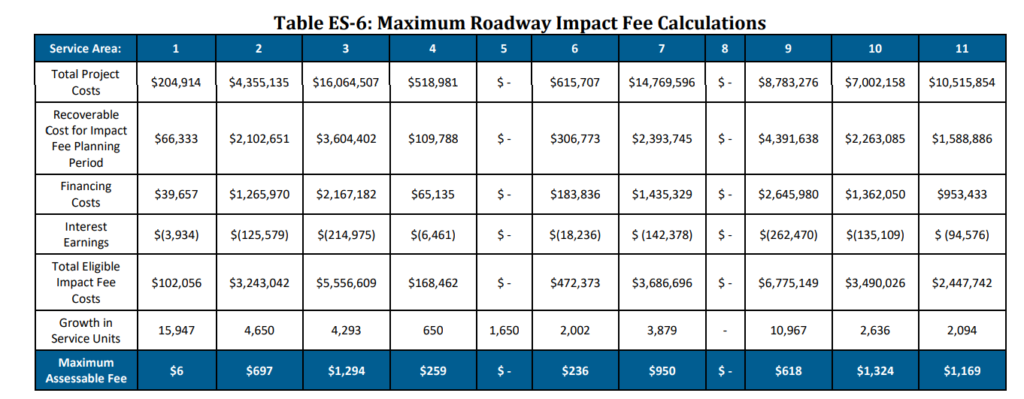
Here we see that after all these steps the maximum impact fee allowable by law for roads in service area one is $6 and for service area eleven is $1,169. These numbers are the final product of that could process we discussed at the very beginning of all of this. That is the process to determine what impact fees could be (as opposed to should be). Whatever the outcome of the should process is, the impact fees cannot exceed these amounts for a single-family residence equivalent.

Jeffrey Vitarius has been actively local since early 2017. He lives in Sanger Heights with partner (JD) and his son (Callahan). He helped found Waco Pride Network and now serves as that organization’s treasurer and Pride Planning Chair. Jeffrey works at City Center Waco where he helps keep Downtown Waco clean, safe, and vibrant. He is a member of St. Alban’s Episcopal Church and graduated from Baylor in 2011.
The Act Locally Waco blog publishes posts with a connection to these aspirations for Waco. If you are interested in writing for the Act Locally Waco Blog, please email [email protected]for more information.
By Becca Muncy
Whether you’re looking for something spooky, something cozy, something family-friendly, something crafty, or something relaxing, you’re sure to find something fun to do this fall! Click the links to find out more information about each event.
First up, everyone’s favorite October holiday: Halloween! There’s no shortage of spooky, scary events going on in Waco right now:
- October 23- Pumpkin Decorating Contest, hosted by Waco Parks and Rec. Submit your decorated pumpkin by October 23 and vote on the best pumpkin until October 30. Winners will be announced on October 30!
- October 23- Halloween Make & Take Workshop at Board and Brush. Create a fun piece of Halloween decor! All materials are provided. There are two afternoon workshop sessions; sign up for the 1:00 session here and the 1:30 session here. Cost is $15.
- October 24- Monsters of Waco Escape Game, hosted by Waco Escape Rooms. Grab your team and get ready to race against the clock and other teams as you solve puzzles around Waco! Your mission: to find the mysterious Monster 11 and solve the mystery of Scary O’Ghouligan. Tickets are $31.
- October 25- Skellington Curiosities’ October Market. Enjoy goods from 30 local vendors and artists, as well as a costume contest. You’re sure to find something spooky at this market!
- October 25- Sensory Friendly Treats-to-Trunk from Elite Therapy Center. Vendors bring the treats to you at this drive-thru reverse trunk or treat for kids with special needs and disabilities!
- October 28- Howl-O-Ween Party with Best Fido Friends. Enter your pup in a costume contest and get a goodie bag!
- October 29-31- Scared Sober Haunted House, hosted by Sunshine Recovery House. Tickets are $5 and all proceeds fund the work of Sunshine Recovery House. Learn more about this event and Sunshine Recovery House from this Act Locally blog post!
- October 30- Halloween Masquerade Late Skate at Skate World Waco. Skate until late, join in on a laser tag tournament, and enter a costume contest! Get tickets here.
- October 30 and 31- Halloween DIY Fun with The Rustic Brush. Pick up your kit (all materials included) and have some Halloween crafting fun at home! Kits cost $20. Reserve your kits here.
- October 31- Free Halloween Skate at Skate World Waco. Come in costume and skate for free!
- October 31- Drive-Thru Trunk or Treat at Holy Spirit Episcopal Church. Trick or treat from the safety of your car!
- October 31- Trunk or Treat + Fall Festival at BridgeChurch
If spooky Halloween activities aren’t your cup of tea, or if you’re just looking to continue the fall fun into November, check out these other fall-themed events:
- October 23-31- Blow-Your-Own Pumpkin Event at Stanton Studios. Make your own unique glass-blown pumpkin! Workshops take place October 23, 24, 30, and 31. Cost is $48.
- October 24- Succulent Pumpkin Workshop & Beer Tasting, hosted by The Plantery and Southern Roots Brewing Co. Enjoy Waco’s best craft brews and create a beautiful succulent pumpkin arrangement!
- October 24- Autumn Uptown Art Walk with The Kieran-Sistrunk Art Gallery and MC Art Supplies. Take a stroll down Washington Avenue and help support Waco artists and musicians!
- November 6-7- LuluBelle’s & Cedar Chest Outdoor Fall Market at Cedar Chest Antique Mall. Visit over 150 vendors at this outdoor fall market, all weekend!
- November 21- Virtual Central Texas Turkey Trot. This year, the 15th annual Turkey Trot has gone virtual! Register by November 20 and log your run anytime from November 21-30. Cost is $40.
- November 27-29- Homestead Fair. Join the Homestead Heritage for a weekend of shopping, crafts, activities, agricultural exhibits, and great food! Check out the schedule of events here.
And, finally, if you’re looking for a way to give back this season, be sure to check out these opportunities:
- The Coats N’ Cocoa Coat Drive, hosted by The New Black Collective. To donate a coat, email [email protected]
- Mentor Waco’s 2nd Annual Friendsgiving Lunch, with Mentor Waco. Donate items now through November 12. See what items are needed here.
This is the round up so far, but we are learning about new events and opportunities for fall fun every day, so keep an eye on the Act Locally Waco Events Calendar.

Becca Muncy is an Act Locally intern from Dallas. She is studying professional writing at Baylor University and is completing her senior year.
The Act Locally Waco blog publishes posts with a connection to these aspirations for Waco. If you are interested in writing for the Act Locally Waco Blog, please email [email protected]for more information.
By Trent Sanders
(You can learn more about “Epiphanies” a new works festival being staged by Wild Imaginings, in Trent Sutton’s blog post from last week. – ALW)
I first heard about Trent and his theatre company, Wild Imaginings, in a funny sort of way. Luann Jennings, founding artist of InSite theatre company in Waco, had invited me to co-direct a show. I accepted, and her welcome to me went, “You’re Trent 2.0.” I thought, “Like Tosh?” To say the least, this name intrigued me. Trent Sutton had directed shows in Waco for a number of years and had recently formed his own company. I wondered under what circumstances I would meet Trent 1.0. All this took place in early 2020, before the shutdowns.
Eighteen months earlier, in October 2018, my wife, three-month old son, and I had moved to Romania. The U.S. Bureau of Educational and Cultural Affairs had awarded me a Fulbright Creative Arts and Performance grant. My stated purpose was to study and write a play about Romanian Christian exiles fleeing the threat of the Romanian Communist Party. Ironically, a year later, in September 2019, I learned that many of these people had moved to the U.S. Some of you may have heard of Lucy Lupu. She and her husband, Petru, have a harrowing story of escape by night. Yet, for my purposes, a different and significant batch of Romanians were still living in Romania.
I told Trent 1.0 all this after the last performance of InSite’s Shakespeare mashup, “Law and Order.” He was kind enough to listen with enthusiasm, then asked me what I did instead. Enter Camelia.

The play is her namesake and her song. She sings of her family, their flight from murderers coming from the East, their saga as refugees, and their multi-generational fight against a broken system. She sings of Romania. Camelia Doru was born in Călimănești – a small village in the Transylvanian Alps. There, she spent her formative years listening to the conversations of many, now famous, Romanian literary dissidents, who were sent there, on the Romanian Communist Party’s dime, to write propaganda (though they never did). She sets out on a journey, armed with her wit against the darkness, to redeem her own history, and by extension, Romania’s.
Trent 1.0 did that sort of frown you do when you hear something you like but have nothing else to add. I said one more thing.
While interviewing Camelia, she mentioned a summit she had attended in 1991. She went on to say the Rockefeller Foundation had summoned the world’s leading torture experts there. He was caught off guard – there are torture experts? Yep. I continued. They met in order to create a tactical map to end torture. Over the course of a week, they mapped out the terrible constellation of torture. Amazed, I asked her if she had a copy. She then rolled out a 100 square foot map. At the center of this nearly invisible universe is the torturer and the victim.
This might sound thought out, but the play was in rough shape when I first showed it to Trent 1.0. He and I both agreed that, in its current form, it had no place in Waco, likely not in Texas, and just a sliver of a chance in the U.S. It was too symbolic. Romanians love that sort of thing, but not so much the Americans.
He prompted me to form it around a question, then to rewrite it according to the question. After that, the play returned to some semblance of its roots. It had begun as an oral history – with me sitting down in Camelia’s office in Bucharest. Asking her questions. Listening. Later on, transcribing. After some thought, I began to ask two big questions: Is her story about how to redeem history? – At least, a kind of redemption in continuum? Is religion somehow involved?
In any case, he asked me to submit the play for his company’s festival, so I did. By April, he informed me that it had been one of eight chosen for a table reading. Fast forward into early May, Trent 1.0 and the actors had done a remarkable job reading and responding to the script. After three hours of this via zoom, I had a great air of confidence for the revisions that lay ahead. And I knew what symbolism to get rid of and how. Camelia’s world, literally closed off to the West until 1989 because of the Iron Curtain, and literarily closed off to the West until June 2020 because of my bad writing – was now readily accessible. I hope it lets you get her. I hope her wit gets you.
But you be the judge on Saturday October 24 at 6:30 PM when Camelia begins streaming. You can purchase a ticket to the festival by clicking here. The cost is $15.
I almost forgot to mention two more things. The problem with faith (and herein lies its power) is that it is incarnational. Culture, place, and era embody it. In Camelia, you will see this conflict: an irreligious woman, encountering godless problems, all while facing God. Is anything out of his purview?
That being so, Camelia loves democracy – the American kind – and I think that shines through. If you love democracy, this is a play for you. If you want to be a part of a conversation about a more perfect union, this play is a great conversation starter.
Peace be with you.

Trent Sanders holds two degrees (B.A. and M.A.) in literature and criticism. After completing his studies, he spent a year studying and making theatre on a Fulbright in Romania. He is currently the playwright in residence at Baylor’s Institute for Oral History.
The Act Locally Waco blog publishes posts with a connection to these aspirations for Waco. If you are interested in writing for the Act Locally Waco Blog, please email [email protected] for more information.
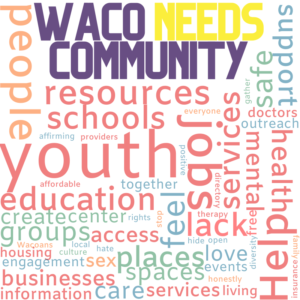
Press Release – Over the past month and a half, Waco Pride Network has gathered input from Waco’s LGBTQ+ community and its allies on what the community’s most pressing needs are, what Waco could be in five years, and what Waco Pride Network can do to pursue that vision. Today, that process reaches its conclusion with the announcement of Vision 2025: Waco Needs Community.
In the vision statement, Waco Pride Network notes, “When we sat down to look at the responses we received, we decided to focus on the words people were using. Three words immediately jumped off the page: Waco needs community. Suddenly, all the needs, fears, and dreams that had been expressed centered themselves around that message. Waco needs community. Waco needs community space. Waco needs community resources. Waco needs community support.”
The vision statement focuses on the words Waco’s queer community and its allies submitted during the public input process. “We need places to be together,” wrote one individual. Waco Pride Network is responding with a commitment to pursue dedicated community spaces in Waco and a vision that these and other safe spaces be available and easily identifiable within five years.
“There’s still a stigma,” writes another individual, “which in turn can and does lead to bullying and being left out. I haven’t noticed it as much here as in the TX Panhandle, but it’s there. Kids are worried about being seen as ‘different’, especially when school is their only real safe haven. Quite a few have problems at home.” The vision highlights the need for community support both within Waco’s queer community and between Waco’s LGBTQ+ folx and Waco in general. “The need here is deeply felt. Our community feels disconnected both from itself and the greater Waco community. We do not see ourselves in business, community, or civic leadership. We do not feel that Waco is for us.”
Ultimately, the statement commits Waco Pride Network to pursuing a Waco with:
- Physical Spaces that are committed to the use of the LGBTQ+ community
- Safe Spaces that are readily available and easily identifiable
- Resources that are identified as accessible and safe
- Regular community engagement through events and a thriving digital community
- The greater Waco community acknowledging the issues faced by the LGBTQ+ community
- An LGBTQ+ community that feels supported by the Waco community, at large
Regarding what you can do, Waco Pride Network has a number of suggestions. “Keep an open mind and engage with the LGBTQ+ people you know,” the statement says. “If you are welcoming and affirming…MAKE it known, hire an LGBTQ+ employee, serve an LGBTQ+ customer, or fund an LGBTQ+ entrepreneur.”
Waco Pride Network works to foster Waco’s LGBTQ+ community. The full vision statement can be found on Waco Pride Network’s website (wacopride.org) and sections of the statement will be shared throughout the day on social media.

Waco Pride Network was officially founded in July 2018 as a nonprofit serving the LGBTQ+ community of the Greater Waco area. Waco Pride Network’s keystone event is the annual OUT on the Brazos festival held each October. The all-volunteer organization continues to grow each year through community support.
Virtual public open house set to take place October 20 – November 3.
Press Release – Over the course of the next several months, Waco Transit System (WTS) and its consultant team will conduct an environmental review pursuant to the National Environmental Policy Act and develop preliminary engineering design plans for the City of Waco’s first Bus Rapid Transit (BRT) corridor.
WTS is developing a 13-mile BRT corridor to provide buses every 15-minutes during peak service hours; including extended service hours to 10 p.m. and service on Sundays to offer safe, reliable and efficient transit service. The route is oriented in a northeast-southwest direction and will serve industrial and commercial employment centers, the Central Business District, as well as important retail centers for residents and visitors; it also connects Waco with the adjacent cities of Woodway, Beverly Hills, Bellmead and Lacy-Lakeview.
In 2018, following the completion of a two-year feasibility study that evaluated the transportation system, travel demand patterns, existing and future land use and input received from the public, Waco Metropolitan Planning Organization (MPO), City of Waco and WTS selected and approved a BRT route that features 14 station locations.
The BRT project has garnered extensive community support and to build further upon that momentum WTS and the Waco MPO look forward to continuing to engage the community throughout the next phase of development.
To help re-engage the community with the BRT project, WTS with the support of the Waco MPO is hosting a virtual public open house that features updated project information available in English and Spanish and an interactive route and station location map. (In light of restrictions on public gatherings, the initial public open house for the BRT project is being offered online, rather than in-person.)
The virtual public open house will remain open through November 3 and can be accessed online at WacoBRTopenhouse.net.
A new BRT project phone line featuring prerecorded messages with a voicemail option for submitting questions and comments is also available. The project phone line number is 844-922-6278 (844-WAC-OBRT).
In the coming months, community members will have an opportunity to review and comment on various BRT corridor amenities and design features; including the station locations and proposed operations scenarios.
To sign-up to receive project-related notices, please email the project at [email protected].
For more information about the Waco BRT project, visit the project website at waco-texas.com/transit/BRT.
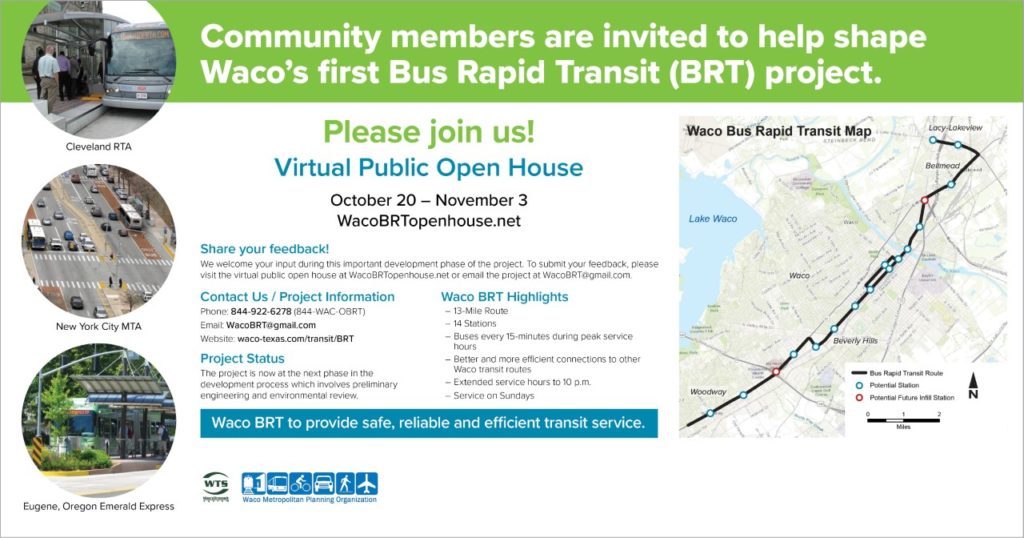
By Mary Beth Kauk, Director of Development

Since the pandemic began in March, Caritas of Waco is serving, on average, over 10,000 individuals a month, many of them affected by Covid-19. When you support Caritas, you are supporting people in our local community, like Sabrina and her daughters.
Sabrina is a single mother of four girls. She also supports her mother who is disabled. Sabrina is the only provider in her household. Sabrina was able to support her family by having a stable job as a General Manager at a local restaurant. Then in March of 2020 everything changed. Due to Covid-19, the restaurant had to close and she was laid-off. Sabrina was devastated.
“Going from a stable job with full-time employment and benefits to unemployment was a huge impact on our family,” said Sabrina. “$500 a month on unemployment is not enough to support four children and two adults.”
Because of her job loss due to Covid-19, Sabrina had to decide whether to pay bills or put food on the table. But things got worse. Sabrina was notified that the restaurant would not make it after the closings of Covid-19 and would be shutting its doors permanently. “I felt hopeless. I felt I had nowhere to turn and then my sister recommended calling Caritas.”
Sabrina called and was connected with a Caritas Intensive Case Manager. Caritas was able to help Sabrina and her family by paying their late electricity bill and rent bill. “Caritas helped me when I had nowhere to turn. In addition to the bill assistance, I am also able to get food at Caritas to help feed my family.”
Sabrina is still job searching but has enrolled in school to use her time to further her education. “It is so hard right now. Not many people are hiring, especially for restaurant general managers. I am thankful that my family and I have a place like Caritas to turn to.”
Sabrina is just one of the thousands of people in our community hurting from the effects of the pandemic. Caritas of Waco has served people in our community for over 53 years and continues to serve as place of hope, especially during this time. To make a gift or to get involved, please visit www.caritas-waco.org. Your support is appreciated now, more than ever.
*Thank you, Sabrina, for your willingness to share your story.

Originally from Virginia, Mary Beth Kauk now calls Texas home. She attended the University of Mary Hardin-Baylor where she obtained her bachelor’s degree and Master of Business Administration in Management. Prior to Caritas, Mary Beth worked in development, marketing, and PR for United Way of Waco-McLennan County and United Way of Central Texas. When she is not working, she enjoys being outdoors and spending time with family and friends. Mary Beth is married to Kasey and they have three fur babies – Wally, Kaiser, and Sunshine.
Press Release – The Waco Suspension Bridge will close for a rehabilitation project beginning the week of October 19. A virtual groundbreaking ceremony will air at 10 a.m. Thursday on the City of Waco Facebook page and Waco City Cable Channel (available on Spectrum and Grande and live stream at www.wccc.tv) to commemorate the start of the project and the 150th anniversary of the bridge.
Significant areas of Indian Spring Park and Martin Luther King, Jr. Park will be closed throughout the duration of the project. Portions of the Waco Riverwalk on both sides of the bridge will also be impacted, as well as traffic lanes along University Parks Drive and Martin Luther King, Jr. Boulevard. While areas surrounding the project site will be affected, the river will remain accessible for watercraft and leisure activities.
The project is slated to last 18 to 24 months. Gibson and Associates, of Balch Springs, Texas, submitted a $12.4 million bid proposal and was selected as the contractor. The project includes widescale updates to the foundations, towers, decking and railings.
Constructed in 1870, Waco’s historic Suspension Bridge is recognized as an engineering marvel of its time and a significant landmark. Notably, this bridge also represents one of the first community-driven civic improvement projects. In the 1860s, local residents contributed the initial funding.
This landmark and its surroundings have become the cultural center of Waco’s public gatherings and recreation, hosting large tourism events and intimate gatherings equally well.
Project partners include funding support from the Tax Increment Financing, engineering by Patrick Sparks of Patrick Sparks Engineering, the Texas Historical Commission, the McLennan County Historical Commission and the City of Waco Historic Landmark Preservation Commission.
For project updates, please visit waco-texas.com or contact the Parks and Recreation Office at (254) 750-8080.
By Anna Dunbar
Have you ever participated in a drug take-back program? If not, what do you do with leftover medicines after you are over that awful head-cold or find some expired pain medicine? I was shocked to learn that some folks think it is a good idea to flush unwanted or expired medicine or put them in their trash. When flushed, medicines can end up in our waterways and can ultimately travel to Texas’ coastal ecosystems. It is possible that chemicals in the flushed medicines are now in our waterways. Why is that? Because wastewater treatment plants, where the flushed stuff goes, do not remove chemicals; the plants remove organic waste in human waste. Obviously, flushing unwanted medications is not a good idea when much safer options are available for no cost.
On Saturday, October 24, folks will have an opportunity to safely clear their shelves of expired, unneeded, or unused medications that may pose a public health threat.
What is accepted: Prescriptions/Over-the-counter medications, veterinary medications, vitamins, minerals and drug samples
What is NOT accepted: Oxygen Tanks, Needles or other sharps, Inhalers or thermometers, Nebulizers or IV bags, hydrogen peroxide, liquids
Waco 24-Hour Drop-off location (Starting Friday morning, October 24 and continuing through Sunday, midnight, October 25)
- WACO POLICE DEPARTMENT, 3115 PINE AVENUE
What if you are not available on October 25?
The following locations have installed safe medication disposal kiosks. Individuals can safely and conveniently dispose of their unwanted, unused or expired medications at no cost. Certain items are NOT accepted including needles, inhalers, aerosol cans, hydrogen peroxide, thermometers, and illicit drugs.
Year-round Medication disposal locations in our area:
- BAYLOR SCOTT & WHITE PHARMACY #251, 1412 N. VALLEY MILLS Dr, SUITE 116, WACO
- WALGREEN CO., 4100 BOSQUE BOULEVARD,WACO
- WALGREEN CO., 9101 WOODWAY DRIVE, WOODWAY
- CVS PHARMACY, INC., 820 S 5TH ST., WACO
Thank you for choosing to do the right thing!
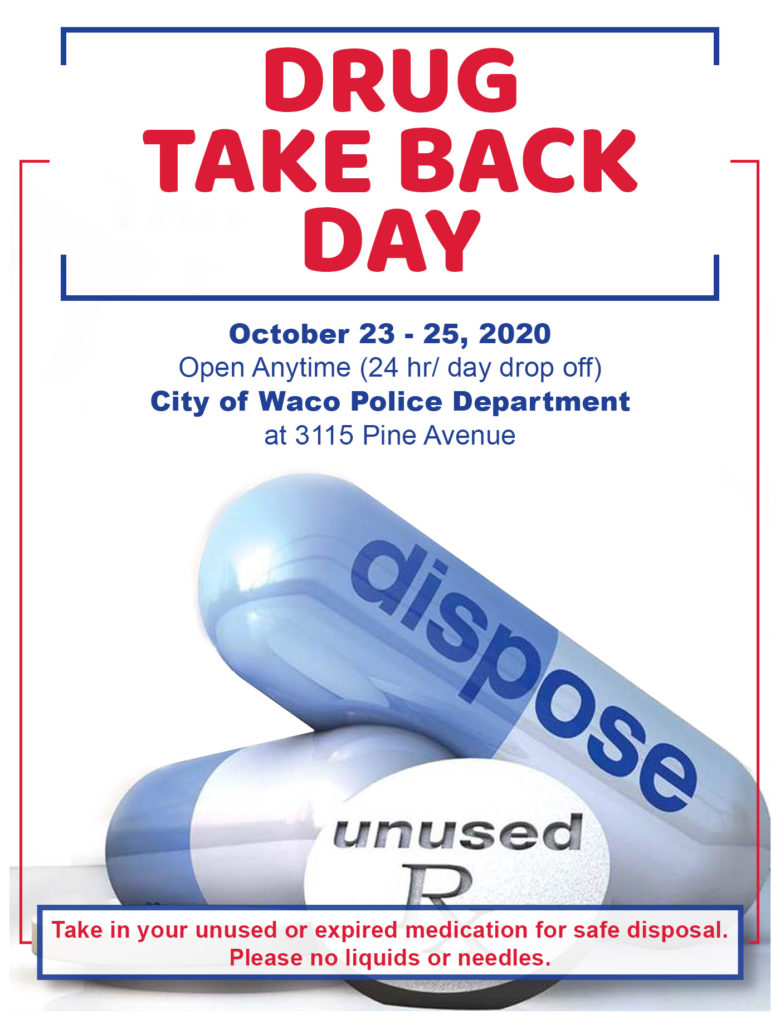
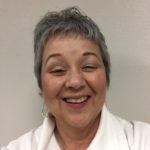
Anna Dunbar is the solid waste administrator for the City of Waco Solid Waste Services. She is responsible for informing Waco residents and businesses about recycling and waste reduction opportunities as well as solid waste services in Waco. Her husband is a Baylor professor and her daughter is a Baylor University alum who works at Horizon Environmental Services, Inc. Anna is an active member of Keep Waco Beautiful and The Central Texas Audubon Society.
The Act Locally Waco blog publishes posts with a connection to these aspirations for Waco. If you are interested in writing for the Act Locally Waco Blog, please email [email protected] for more information.

